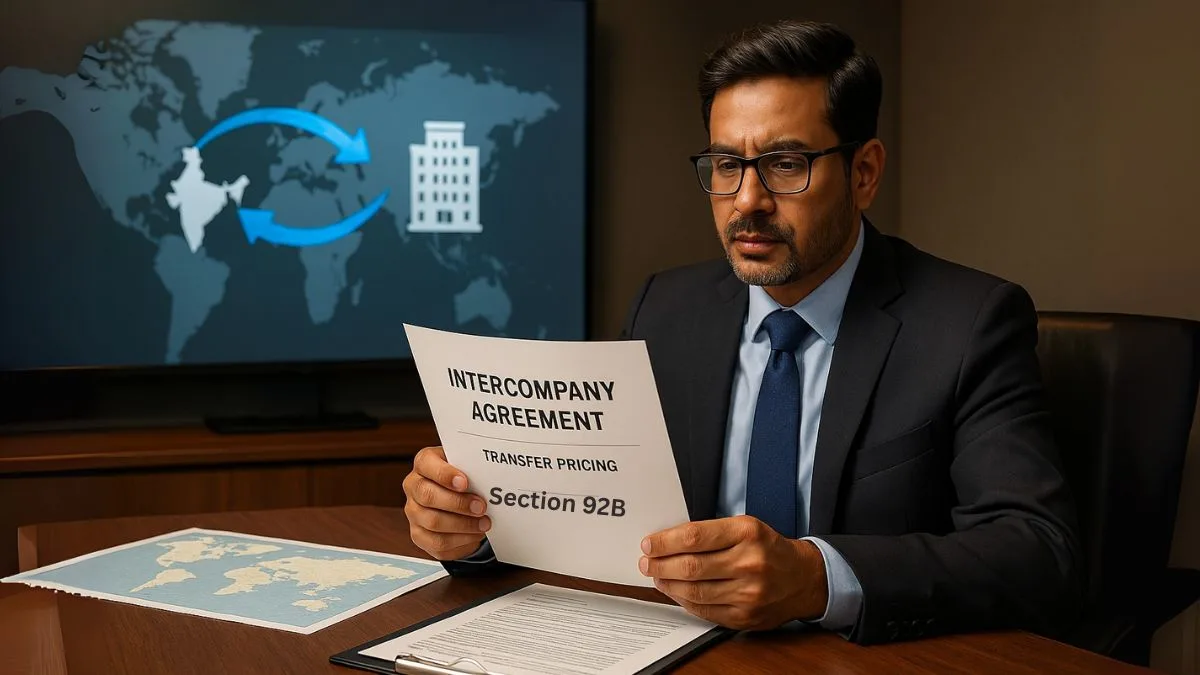
In today’s interconnected global economy, businesses frequently engage in cross-border operations—whether through foreign subsidiaries, international service contracts, or global supply chains. While these international dealings offer strategic advantages, they also demand a high degree of regulatory transparency, particularly in the realm of pricing arrangements.
This is precisely where Section 92B of the Income Tax Act becomes significant.
Section 92B governs international transactions & serves as a cornerstone of India’s transfer pricing regulations. It mandates that any transaction involving associated enterprises across borders must adhere to arm’s length principles to ensure fair taxation. For enterprises involved in global trade or services, a clear understanding of this provision is essential to maintain compliance, prevent disputes, and avoid penalties imposed by tax authorities.
Let’s simplify it step-by-step.
What is Section 92B of the Income Tax Act?
Section 92B defines the term international transaction. It refers to any transaction between two or more associated enterprises, where at least one of the parties is a non-resident, & the transaction involves goods, services, or intangibles.
The idea behind this section is to prevent companies from manipulating prices between related entities in different countries to reduce tax liabilities in India.
So, if your Indian entity transacts with its foreign parent, subsidiary, or group company, the deal must be at arm’s length price, meaning the same price as if the parties were unrelated.
Types of Transactions Covered Under Section 92B
The definition of an international transaction is broad. It covers:
- Purchase or sale of tangible goods
- Provision of services
- Lending or borrowing of money
- Use or transfer of intangible assets like patents or trademarks
- Cost-sharing arrangements
- Business restructuring or reorganisation
- Guarantees or financial support between related parties
Essentially, any related party transaction between associated enterprises involving money, services, or assets across borders falls under this section.
What Are Associated Enterprises?
Two enterprises are called associated enterprises if one of them participates directly or indirectly in the management, control, or capital of the other. This includes:
- Parent-subsidiary relationships
- Joint ventures
- Companies with common directors
- Entities where one enterprise holds more than 26% voting rights in another
Once this connection is established, Section 92B becomes applicable to all qualifying transactions.
Deemed International Transactions
Here’s an interesting twist.
Even if a transaction is between two Indian entities, it could still be covered under Section 92B if a third associated enterprise located abroad is involved in influencing the transaction. These are known as deemed international transactions.
For example, if an Indian company enters into an agreement with another Indian company on behalf of its foreign parent, it’s a deemed international transaction, and hence, transfer pricing rules will apply.
Importance of Arm’s Length Price
The concept of arm’s length price (ALP) ensures that the pricing of international transactions is fair & transparent. You cannot charge your foreign subsidiary less than what you'd charge an unrelated customer — that’s tax evasion.
The Income Tax Department expects every international transaction under Section 92B to adhere to ALP. Failure to do so could trigger adjustments, penalties, and transfer pricing audits."
Transfer Pricing Documentation
If your business is covered under Section 92B, you’re required to maintain transfer pricing documentation, which includes:
- Details of international transactions
- Nature & terms of transactions
- Functional analysis of the entities involved
- Benchmarking study to determine ALP
- Method of computing the arm's length price
These documents must be submitted to the tax department when required. Non-compliance can result in penalties up to 2% of the value of international transactions.
Who Needs to Comply with Section 92B?
You must comply with Section 92B of the Income Tax Act if:
- Your company has foreign associated enterprises
- You’ve conducted international transactions, directly or indirectly
- You're involved in cross-border services, royalties, interest payments, or technology transfers
- Your business underwent international restructuring or support arrangements
Many Indian startups & tech companies working with foreign parent firms fall under this umbrella.
Common Mistakes to Avoid
- Treating only goods and ignoring services or intangible transactions
- Missing out on deemed international transactions
- Inadequate transfer pricing documentation
- Not benchmarking related party transactions correctly
- Using arbitrary pricing without applying the arm’s length principle
Avoiding these mistakes ensures compliance & peace of mind during tax assessments."
Real-World Example
Imagine an Indian IT firm providing software development services to its US-based parent company. If it charges $10/hour while the market rate is $25/hour, the tax department may disallow part of the expense and add it to the Indian firm’s taxable income.
Why? Because the transaction wasn't at arm’s length price, violating Section 92B.
Final Thoughts
In an increasingly global world, Section 92B of the Income Tax Act acts as a safeguard to ensure that international transactions between associated enterprises are carried out fairly & transparently. Whether you’re transferring funds, services, or intellectual property, pricing must be at arm’s length and well-documented.
If your business involves cross-border transactions, it's crucial to understand the scope, maintain proper records, and comply with transfer pricing regulations under this section.
Struggling with transfer pricing compliance or documentation under Section 92B? The experts at Callmyca.com can help you stay audit-ready, legally sound, and tax-efficient. Get in touch now and let us take care of the complex stuff while you focus on scaling globally.











